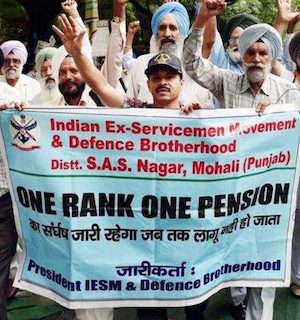OROP demand: Need for alternative plan
The issue is OROP (One Rank One Pension), and the question is: Has the time come to think differently in regards to the implementation of OROP?
There is no need to elucidate the truthfulness, importance, and relevance of the OROP demand. However, the reality is that for many years the political actors have been hesitant to implement it. The political position may be sympathetic towards OROP demand simply because it can’t be otherwise. The real issue is that defence personnel do not account for a major vote bank (as it is not many of them vote) and more importantly, their political leanings are difficult to judge. Naturally, there would then be a resistance to commit for their benefit involving high financial costs. The issue is of money, and it would remain so in the years to come. The recent acceptance of OROP should be viewed against this backdrop.
The veterans are not happy with the overall OROP package and are planning to continue with their demands. Now, the question is, why should the veterans continue with their demand in the present format when they know that the other party is reluctant and trying to avoid giving all the benefits?
It is also important to factor in some hard ground realities that have been highlighted for long by research groups that the system providing financial security for the old is coming under increasing strain throughout the world, particularly owing to rising life expectancy and increase in growth of older people. Globally, there have been major crises in some cases towards effectively managing pension schemes. The question is, should the faujis assume that the government-backed pension scheme would remain sustainable for eternity. In case of any possible financial crisis, would the government of the day be in a position to continue with this scheme?
The Indian Armed Forces are the federal military forces of the Union of the Republic of India. In a democratic dispensation like India, the government is responsible for ensuring the country's defence and armed forces work under civilian command. Naturally, regarding administrative issues like pay, pension, etc., the government would have the final say. With regards to pay, the government has few structures like the pay commission, which caters for periodic reviews and makes recommendations. The issues about the increments in pensions also broadly fall under the ambit of the successive pay commissions' recommendations. Given this backdrop, OROP is a different idea. For the last three to four decades, the successive governments have been uncomfortable regarding the additional financial burden on state coffers owing to OROP.
Under such circumstances, why should the soldiers, who have fought gallantly during wartimes and accepted peacetime challenges, reduce themselves to mere helpless agitators? The Indian soldiers have fought for their motherland with ‘whatever they have got’ for all these years. Despite limited resources, Indian soldiers have won many battles because of their boldness and intelligence. Time has come to use intelligence, read into the system’s reluctance and think of developing an alternative mechanism for implementation of OROP. The veterans should ask themselves: in the 21st-century globalised world, is the government treasury the only “charity” for the soldiers to get their justified dues?
Today the just demand of the soldiers’ community is being projected as a ‘liability’ and hence time has come to think differently. Would it be possible for the soldiers’ community to raise the required money by starting a corpus on their own? It is well understood that this is not going to be a one-time affair, but a lifelong commitment and no financial calculations have been made even to check the workability of such an idea. Indian soldiers are known to make the impossible possible. Today, more than money it is the prestige of the Indian soldiers at stake, particularly when their demands are getting projected as a ‘burden.’ They should thus stand up and demonstrate their tenacity.
One option could be to allow the existing pension scheme (post-government accepted OROP) to continue and create a different mechanism to provide additional OROP benefits. For this purpose, there is a need to create a corpus to cater to the ‘difference’. On the face of it, the fauji community has no experience in planning and executing such unwieldy proposals. To date, they have only been involved in housing projects and have started a few welfare measures like building colleges, etc. Implementing the OROP concept as a corpus is like going to Mars! But serving and retired faujis and their kith and kin could evolve as a major force capable of undertaking any impossible task.
The basic question would be, ‘Where would the money come and how will the project be implemented? It is possible to create such a corpus under the Indian Constitution. To make such an idea a success, governmental assistance is a must. The structure of a corpus can only become a reality when the government provides all the required clearances as per the rules and regulations. From the Indian industry to common people, anybody could contribute towards building such a corpus. The corpus should accept donations only by cheque payments. The government should permit donations from abroad too. What is important is to create a fully transparent system with proper checks and balances.
Some percentage of the fauji community is reasonably well-off after retirement. They could continue to draw their normal pension and forgo benefits of OROP, which the proposed corpus could offer (something akin to giving up LPG subsidy!). Since this would be a corpus created by the faujis and for the faujis it is expected that they themselves should take the lead in making contributions. All should welcome any constructive idea which follows the laws of the land.
